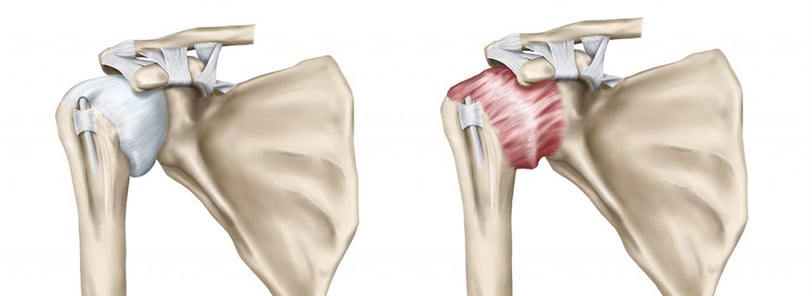"Restore Mobility, Relieve Pain: Ayurvedic Solutions for Frozen Shoulder"


Frozen Shoulder: Ayurvedic Insights and Remedies
What is Frozen Shoulder? Frozen shoulder, known medically as adhesive capsulitis, is a condition characterized by stiffness, pain, and limited range of motion in the shoulder joint. It develops when the capsule surrounding the shoulder joint thickens and tightens, restricting movement. The condition usually progresses through three stages: freezing, frozen, and thawing, each of which may last for several months.
From an Ayurvedic perspective, frozen shoulder is often linked to an imbalance in the Vata dosha, which governs movement and flow in the body. An excess of Vata can lead to stiffness and pain, making it a prime factor in this condition.
Ayurvedic View on Frozen Shoulder
In Ayurveda, frozen shoulder is seen as a Vata disorder due to its symptoms like pain, stiffness, and restricted motion. Vata imbalance often leads to the drying of bodily tissues, aggravating stiffness and restricting the free movement of joints. Additionally, frozen shoulder can be caused by a combination of factors, including poor diet, lack of exercise, excessive stress, and exposure to cold.
Ayurveda focuses on a holistic approach for healing that not only alleviates the symptoms but also addresses the root cause of the imbalance.
Ayurvedic Remedies for Frozen Shoulder
Here are some effective Ayurvedic treatments and remedies to restore balance and ease the symptoms of frozen shoulder:
1. Abhyanga (Oil Massage)
Abhyanga is one of the most effective therapies for frozen shoulder. Regular oil massage using medicated oils like Mahanarayan oil, Ksheerabala oil, or Sesame oil helps in alleviating Vata and restoring mobility. Warm oil penetrates deeply into the tissues, relaxing the muscles and increasing circulation in the affected area.
Method: Warm the oil slightly and apply it to the shoulder and upper back. Massage gently in circular motions for 10-15 minutes daily.
2. Pinda Sweda (Herbal Poultice Therapy)
Pinda Sweda involves the application of warm herbal poultices on the affected area. These poultices, made from Vata-balancing herbs, help reduce stiffness, alleviate pain, and increase mobility.
Herbs used: Nirgundi (Vitex negundo), Rasna (Pluchea lanceolata), and Eranda (Castor) leaves are often used to make the poultices.
Method: The herbal poultices are heated and gently massaged over the shoulder to soothe the muscles.
3. Herbal Supplements
Ayurvedic herbs can support internal healing and address the underlying Vata imbalance.
Ashwagandha (Withania somnifera): Known for its anti-inflammatory and muscle-relaxant properties, ashwagandha strengthens tissues and supports faster recovery.
Guggulu: An effective anti-inflammatory herb, Shallaki (Boswellia serrata), or Yograj Guggulu helps reduce pain and improve joint mobility.
Turmeric (Haridra): Turmeric, a natural anti-inflammatory, can be taken with warm milk or as part of herbal formulations.
4. Dietary Guidelines
A Vata-pacifying diet can help reduce the symptoms of frozen shoulder. Favor warm, moist, and slightly oily foods.
Include cooked vegetables, whole grains like rice and wheat, and lentils.
Use warming spices like ginger, cinnamon, cumin, and turmeric in your meals.
Avoid cold, dry, and raw foods, as well as caffeine, which aggravate Vata.
5. Panchakarma Therapy
For severe cases of frozen shoulder, Panchakarma therapies such as Virechana (Therapeutic Purgation) or Basti (Medicated Enema) can be beneficial. These treatments detoxify the body, balance Vata, and promote healing.
Basti is particularly useful as it directly balances Vata in the body. Erandmooladi Basti (castor oil-based enema) helps to alleviate deep-seated Vata issues.
6. Gentle Exercise & Yoga
Slow, controlled movements are key to regaining shoulder mobility. Practice gentle shoulder stretches and yoga postures that enhance flexibility without straining the muscles.
Yoga Asanas: Gentle Bhujangasana (Cobra Pose), Gomukhasana (Cow Face Pose), and Marjaryasana (Cat-Cow Pose) help improve mobility and release stiffness.
Pranayama: Practicing breathing exercises like Nadi Shodhana (alternate nostril breathing) helps to calm the mind and balance Vata.
Lifestyle Tips to Manage Frozen Shoulder
Avoid cold exposure: Keep the shoulder warm by covering it with clothing, as cold aggravates Vata.
Hydrate well: Keep your body hydrated to maintain tissue flexibility.
Rest adequately: Ensure you rest your shoulder when it’s in pain, but avoid complete immobility.
Maintain proper posture: Avoid slouching or straining your shoulder during daily activities, as poor posture can worsen symptoms.
Conclusion
Ayurvedic treatments for frozen shoulder focus on addressing the root cause of Vata imbalance, promoting holistic healing through lifestyle changes, therapies, and herbal remedies. Consistent application of these treatments can relieve stiffness and pain, allowing for a smoother recovery process.
For personalized advice and treatment plans, consult with a qualified Ayurvedic practitioner to tailor the approach to your unique needs.


